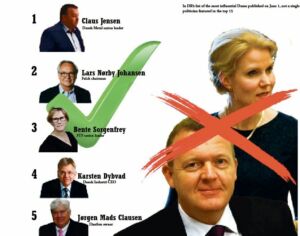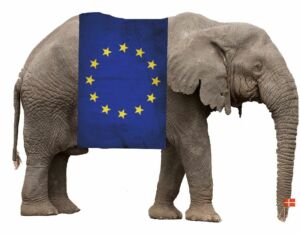News
The yellow-starred blue elephant in the room: EU issues in the election
This article is more than 10 years old.
EU questions make a late appearance in the general election discourse

In DR’s list of the most influential Danes published on June 1, not a single politician featured in the top 15
The 350,000 or so foreigners living in Denmark won’t have received a voting card in the post last week, and they won’t have had cause to visit the polling stations with their Danish neighbours on Thursday June 18.
But disenfranchised as they may be in this general election, some consolation may be found in the extent of the supranational influence exerted on Denmark in the form of EU law and initiatives.
Supranational influence
A 2014 study by Altinget Research showed that a third of laws passed in Denmark are influenced by EU law, with the union’s clout actually stretching even further via initiatives that have a direct effect on the national administrative practice and do not require a law change.
The ability of domestic politicians to affect everyday life in the country was called into question even further when a recent study by DR Nyheder ranking the 15 most influential Danes included not one politician. Business leaders, trade union bosses and chief lobbyists dominated the list.
What about Europe?
But significant as the EU is for Danish politics, any discussion of it was conspicuous by its absence during the early weeks of the election campaign. That changed last week as questions about the nature of Denmark’s continued role in the union were brought into the spotlight.
Party representatives gathered around the question of whether a possible British exit from the EU (or Brexit) should precipitate a DKexit in a radio debate on DR’s P1 station. Here the right-leaning parties voiced partial support for taking a lead from the Brits.
Joint statement
This was followed up more concretely when the four opposition parties Venstre, Konservative, Liberal Alliance and Dansk Folkeparti made a joint statement about how a blue government would be likely to follow David Cameron’s lead in seeking to renegotiate the country’s engagement in the union.
Cameron is currently on a charm offensive, seeking to garner support for his proposed EU reforms from European leaders. The British prime minister will take some encouragement from the recent developments in Denmark.
Fundamental solutions
“In the EU we would back the British government’s efforts to negotiate a new regime for the UK in the EU,” the parties state quite unequivocally in the statement.
“It is crucial for Danish interests that the UK – as one of our most important allies – remains centrally placed in EU co-operation. A British solution could also pave the way for more fundamental solutions to challenges, for example, in relation to migrant workers.”

No to a social union
The four-party declaration released last week is entitled ‘Danish welfare in Europe’, and at its core is an agreement between the parties that they do not want the course of Denmark’s involvement in Europe to be towards a so-called social union.
“We are far from in agreement about everything regarding the EU,” the statement read.
“But we agree that if Denmark gets a new government after the general election on June 18, we will stand together behind the UK’s and other like-minded countries’ work to ensure that the EU doesn’t become a social union.”
Concerns over benefits
Helle Thorning Schmidt’s government came under fire last year from the opposition when it dropped some accrual rules, which had previously limited access to Danish social benefits to EU citizens and allowed child benefits to be granted for children not living in Denmark, in order to satisfy EU free-movement rules.
This is something, according to the blue EU consensus, that a government led by Lars Løkke Rasmussen would seek to reverse.
“There should be a reasonable relationship between contributing positively and being able to receive,” the document stated.
“Therefore we would initiate work to ensure that Danish welfare benefits stay in Denmark and go to people who work, live and contribute to Denmark over an extended period.”
Continued membership
While the common position of the blue parties could spell the beginning of a new, more Euro-sceptical era of EU policy in Denmark, there is no talk of ending EU membership altogether.
Thomas Larsen, Berlingske Tidene’s political commentator, explains that this was true, even of Dansk Folkeparti.“It’s important to understand that the four party leaders want a continued Danish membership in the EU,” he said in the newspaper. “This applies even to the most EU-sceptical party: Dansk Folkeparti. They want to stay in the EU, but want to work towards a modernised and reformed EU, where nation states have more influence on conditions that are important for them.”
Government’s stance
Martin Lidegaard, the foreign minister, told Berlingske that he agrees that changes are needed to the benefits regime for EU citizens, but differs when it comes to the scope for affecting them.
“We all agree that there needs to be adjustments in relation to these welfare benefits and how we handle them,” he said.
“But I also thought we all agreed that we fundamentally didn’t want to change free movement in Europe.”
Not at any cost
According to Lidegaard, Denmark shouldn’t jeopardise its position in the single market by pursuing change at any cost.
“Denmark benefits from and is completely dependent on the single market in the EU,” he said.
“It is there we sell our products and Danish companies are crying out for the European workforce, and if we destroy it, it will be desperately costly for Denmark.”










































